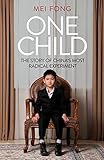One child : the story of China's most radical experiment / Mei Fong.
Publisher: London : Oneworld, 2016Description: xvi, 250 pages.Content type: text Media type: unmediated Carrier type: volumeISBN: 9781780748450.Subject(s): Family planning -- Government policy -- China| Item type | Current library | Class number | Copy number | Status | Date due | Barcode | |
|---|---|---|---|---|---|---|---|
| Book | House of Lords Library - Palace Dewey | 363.960951 FON (Browse shelf(Opens below)) | 1 | Available | 013359 |
Browsing House of Lords Library - Palace shelves, Shelving location: Dewey Close shelf browser (Hides shelf browser)

|

|

|

|

|

|

|
||
| 363.88309567 SOU Backstabbing for beginners : | 363.9209 RUT Control : the dark history and troubling present of eugenics / | 363.9609410904 RUS Women's medicine : sex, family planning and British female doctors in transnational perspective, 1920-70 / | 363.960951 FON One child : | 364 AKE Criminological theories / | 364 AMN United States of America : | 364 BEA Dead not buried : |
After the quake -- And the clock struck 8/8/08 -- Cassandra and the rocketmen -- The population police -- Little emperors, grown up -- Welcome to the dollhouse -- Better to struggle to live on, than die a good death -- The red thread is broken -- Babies beyond borders.
When Communist Party leaders adopted the one-child policy in 1980, they hoped curbing birth-rates would help lift China's poorest and increase the country's global stature. But at what cost? Now, as China closes the book on the policy after more than three decades, it faces a population grown too old and too male, with a vastly diminished supply of young workers. Mei Fong has spent years documenting the policy's repercussions on every sector of Chinese society. In One Child, she explores its true human impact, traveling across China to meet the people who live with its consequences. Their stories reveal a dystopian reality: unauthorized second children ignored by the state, only-children supporting aging parents and grandparents on their own, villages teeming with ineligible bachelors, and an ungoverned adoption market stretching across the globe. Fong tackles questions that have major implications for China's future: whether its 'Little Emperor' cohort will make for an entitled or risk-averse generation; how China will manage to support itself when one in every four people is over sixty-five years old; and above all, how much the one-child policy may end up hindering China's growth. One Child offers a nuanced and candid report from the extremes of family planning.
